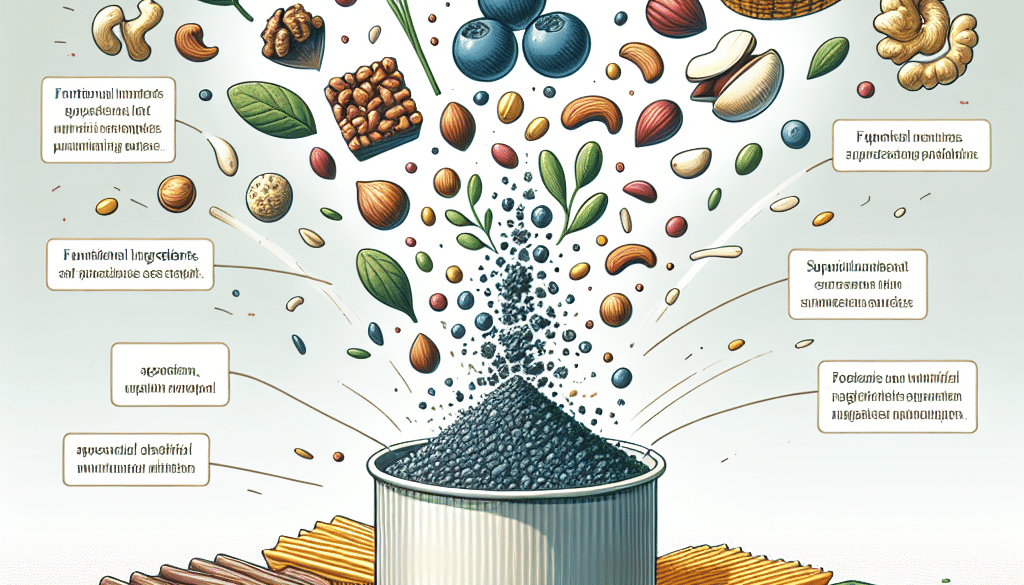Snack Innovations: Functional Ingredients Add Nutritional Boost
-
Table of Contents
- Snack Innovations: Boosting Nutrition with Functional Ingredients
- The Rise of Functional Snacking
- Key Functional Ingredients in Snacks
- Examples of Innovative Snack Products
- Health Benefits and Consumer Perception
- Challenges in Snack Innovation
- Case Studies: Success Stories in Functional Snacking
- Conclusion: The Future of Snacking is Functional
- Discover ETprotein’s High-Quality Protein Products
Snack Innovations: Boosting Nutrition with Functional Ingredients

The snack industry has been undergoing a transformation, with a growing emphasis on health and nutrition. Consumers are increasingly seeking out snacks that not only satisfy their cravings but also provide a nutritional boost. This shift has led to the rise of functional ingredients in snack products, which are components that offer health benefits beyond basic nutrition. In this article, we will explore the latest trends in snack innovations, focusing on how functional ingredients are being used to enhance the nutritional profile of these convenient foods.
The Rise of Functional Snacking
Functional snacking is not just a fleeting trend; it’s a response to the global demand for healthier food options. With busy lifestyles leading to less time for traditional meals, consumers are turning to snacks to fill nutritional gaps. This has created an opportunity for food manufacturers to innovate with ingredients that can deliver vitamins, minerals, protein, fiber, and other essential nutrients.
Key Functional Ingredients in Snacks
Several functional ingredients have gained popularity in the snack industry. Here’s a look at some of the most prevalent ones:
- Proteins: Plant-based proteins like pea, rice, and soy are being added to snacks to increase their protein content, which is essential for muscle repair and growth.
- Fibers: Ingredients such as chicory root and inulin not only add fiber to snacks but also act as prebiotics, supporting gut health.
- Superfoods: Foods like chia seeds, quinoa, and kale are packed with antioxidants, vitamins, and minerals, making them ideal for nutrient-dense snacks.
- Omega-3 Fatty Acids: Flaxseeds and walnuts are examples of ingredients rich in omega-3s, which are beneficial for heart and brain health.
- Probiotics: Live cultures found in yogurt and other fermented products can enhance digestive health when included in snack formulations.
Examples of Innovative Snack Products
Many companies are leading the way in functional snack innovation. Here are a few examples:
- Protein Bars: Brands like Quest and RXBAR have developed protein bars with simple, whole-food ingredients that provide a substantial protein punch.
- Fiber-Rich Chips: Companies such as Beanitos offer chips made from beans, providing a high-fiber, high-protein alternative to traditional potato chips.
- Superfood Snacks: Navitas Organics produces snacks like power bites and superfood+ seeds and nuts that are loaded with organic superfoods.
- Omega-3 Enriched Snacks: Flackers makes flaxseed crackers that are high in omega-3 fatty acids and fiber.
- Probiotic Snack Packs: Lifeway Foods has created probiotic kefir cups with mix-ins like nuts and granola for a gut-friendly snack.
Health Benefits and Consumer Perception
Functional snacks are not only about adding beneficial ingredients; they’re also about meeting consumer expectations for health and wellness. Research has shown that functional ingredients can contribute to various health benefits, such as improved digestion, enhanced immune function, and reduced risk of chronic diseases. As consumers become more educated about the impact of diet on health, they are more likely to seek out snacks that contribute positively to their well-being.
Challenges in Snack Innovation
While the potential for functional snacks is vast, there are challenges that manufacturers face. These include:
- Taste and Texture: Functional ingredients must be incorporated without compromising the sensory appeal of the snack.
- Cost: High-quality functional ingredients can be expensive, potentially increasing the final product’s price.
- Shelf Life: Some functional ingredients may affect the shelf life of the snack, requiring careful formulation and packaging.
- Regulatory Compliance: Claims about health benefits must be substantiated and comply with local and international regulations.
Case Studies: Success Stories in Functional Snacking
Several brands have successfully navigated these challenges. KIND Snacks, for example, has a line of bars that include nuts, seeds, and fruits, providing a wholesome snack with a transparent ingredient list. Another success story is HIPPEAS, which offers organic chickpea puffs that are high in fiber and protein while being low in calories.
Conclusion: The Future of Snacking is Functional
The snack industry is evolving, with functional ingredients playing a central role in new product development. As consumers continue to prioritize health and nutrition, the demand for snacks that offer more than just empty calories is likely to grow. By incorporating functional ingredients, manufacturers can meet this demand and differentiate their products in a competitive market.
Discover ETprotein’s High-Quality Protein Products
If you’re looking to enhance your snack products with functional ingredients, consider ETprotein’s range of high-quality protein offerings. Their organic bulk vegan proteins and L-(+)-Ergothioneine are perfect for adding a nutritional boost to any snack. With a commitment to non-GMO, allergen-free ingredients, and a variety of protein sources, ETprotein can help you create snacks that stand out for their health benefits and great taste.
About ETprotein:
ETprotein, a reputable protein and L-(+)-Ergothioneine (EGT) Chinese factory manufacturer and supplier, is renowned for producing, stocking, exporting, and delivering the highest quality organic bulk vegan proteins and L-(+)-Ergothioneine. They include Organic rice protein, clear rice protein, pea protein, clear pea protein, watermelon seed protein, pumpkin seed protein, sunflower seed protein, mung bean protein, peanut protein, and L-(+)-Ergothioneine EGT Pharmaceutical grade, L-(+)-Ergothioneine EGT food grade, L-(+)-Ergothioneine EGT cosmetic grade, L-(+)-Ergothioneine EGT reference grade and L-(+)-Ergothioneine EGT standard. Their offerings, characterized by a neutral taste, non-GMO, allergen-free attributes, with L-(+)-Ergothioneine purity over 98%, 99%, cater to a diverse range of industries. They serve nutraceutical, pharmaceutical, cosmeceutical, veterinary, as well as food and beverage finished product distributors, traders, and manufacturers across Europe, USA, Canada, Australia, Thailand, Japan, Korea, Brazil, and Chile, among others.
ETprotein specialization includes exporting and delivering tailor-made protein powder and finished nutritional supplements. Their extensive product range covers sectors like Food and Beverage, Sports Nutrition, Weight Management, Dietary Supplements, Health and Wellness Products, and Infant Formula, ensuring comprehensive solutions to meet all your protein needs.
As a trusted company by leading global food and beverage brands and Fortune 500 companies, ETprotein reinforces China’s reputation in the global arena. For more information or to sample their products, please contact them and email sales(at)ETprotein.com today.












